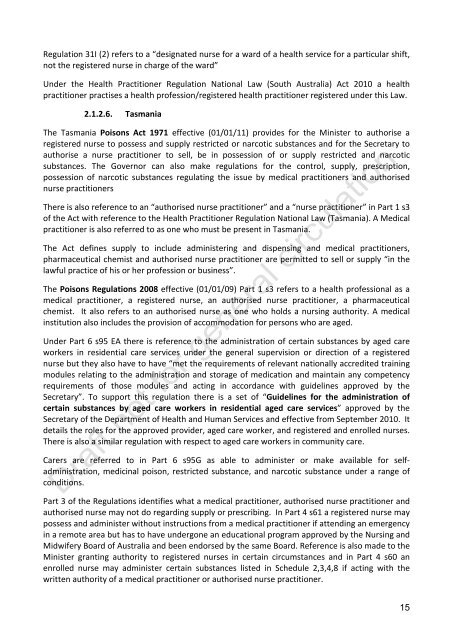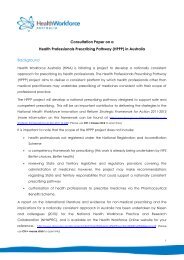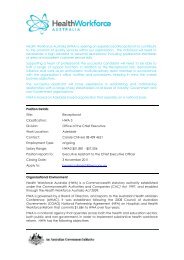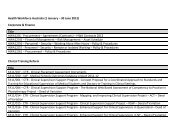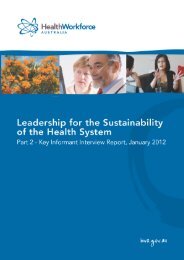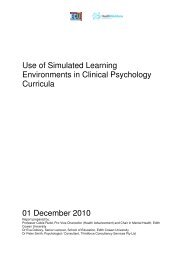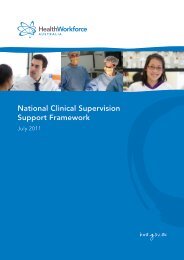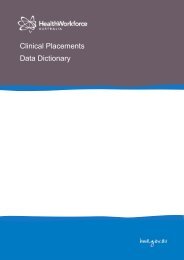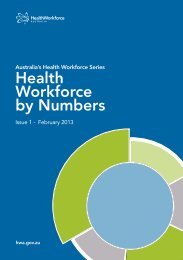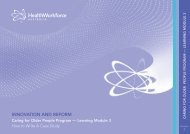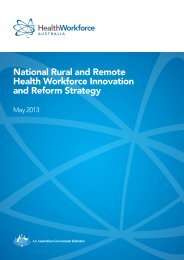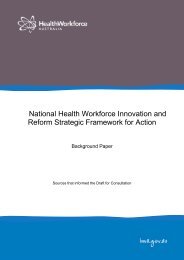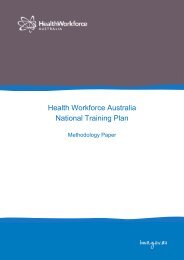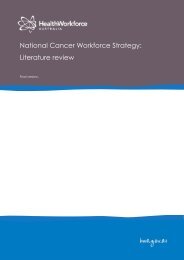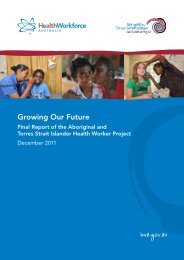SUMMARY - Safe Medications Management project: Key issues and ...
SUMMARY - Safe Medications Management project: Key issues and ...
SUMMARY - Safe Medications Management project: Key issues and ...
Create successful ePaper yourself
Turn your PDF publications into a flip-book with our unique Google optimized e-Paper software.
Regulation 31I (2) refers to a “designated nurse for a ward of a health service for a particular shift,not the registered nurse in charge of the ward”Under the Health Practitioner Regulation National Law (South Australia) Act 2010 a healthpractitioner practises a health profession/registered health practitioner registered under this Law.2.1.2.6. TasmaniaThe Tasmania Poisons Act 1971 effective (01/01/11) provides for the Minister to authorise aregistered nurse to possess <strong>and</strong> supply restricted or narcotic substances <strong>and</strong> for the Secretary toauthorise a nurse practitioner to sell, be in possession of or supply restricted <strong>and</strong> narcoticsubstances. The Governor can also make regulations for the control, supply, prescription,possession of narcotic substances regulating the issue by medical practitioners <strong>and</strong> authorisednurse practitionersThere is also reference to an “authorised nurse practitioner” <strong>and</strong> a “nurse practitioner” in Part 1 s3of the Act with reference to the Health Practitioner Regulation National Law (Tasmania). A Medicalpractitioner is also referred to as one who must be present in Tasmania.The Act defines supply to include administering <strong>and</strong> dispensing <strong>and</strong> medical practitioners,pharmaceutical chemist <strong>and</strong> authorised nurse practitioner are permitted to sell or supply “in thelawful practice of his or her profession or business”.The Poisons Regulations 2008 effective (01/01/09) Part 1 s3 refers to a health professional as amedical practitioner, a registered nurse, an authorised nurse practitioner, a pharmaceuticalchemist. It also refers to an authorised nurse as one who holds a nursing authority. A medicalinstitution also includes the provision of accommodation for persons who are aged.Under Part 6 s95 EA there is reference to the administration of certain substances by aged careworkers in residential care services under the general supervision or direction of a registerednurse but they also have to have “met the requirements of relevant nationally accredited trainingmodules relating to the administration <strong>and</strong> storage of medication <strong>and</strong> maintain any competencyrequirements of those modules <strong>and</strong> acting in accordance with guidelines approved by theSecretary”. To support this regulation there is a set of “Guidelines for the administration ofcertain substances by aged care workers in residential aged care services” approved by theSecretary of the Department of Health <strong>and</strong> Human Services <strong>and</strong> effective from September 2010. Itdetails the roles for the approved provider, aged care worker, <strong>and</strong> registered <strong>and</strong> enrolled nurses.There is also a similar regulation with respect to aged care workers in community care.Carers are referred to in Part 6 s95G as able to administer or make available for selfadministration,medicinal poison, restricted substance, <strong>and</strong> narcotic substance under a range ofconditions.Part 3 of the Regulations identifies what a medical practitioner, authorised nurse practitioner <strong>and</strong>authorised nurse may not do regarding supply or prescribing. In Part 4 s61 a registered nurse maypossess <strong>and</strong> administer without instructions from a medical practitioner if attending an emergencyin a remote area but has to have undergone an educational program approved by the Nursing <strong>and</strong>Midwifery Board of Australia <strong>and</strong> been endorsed by the same Board. Reference is also made to theMinister granting authority to registered nurses in certain circumstances <strong>and</strong> in Part 4 s60 anenrolled nurse may administer certain substances listed in Schedule 2,3,4,8 if acting with thewritten authority of a medical practitioner or authorised nurse practitioner.15


